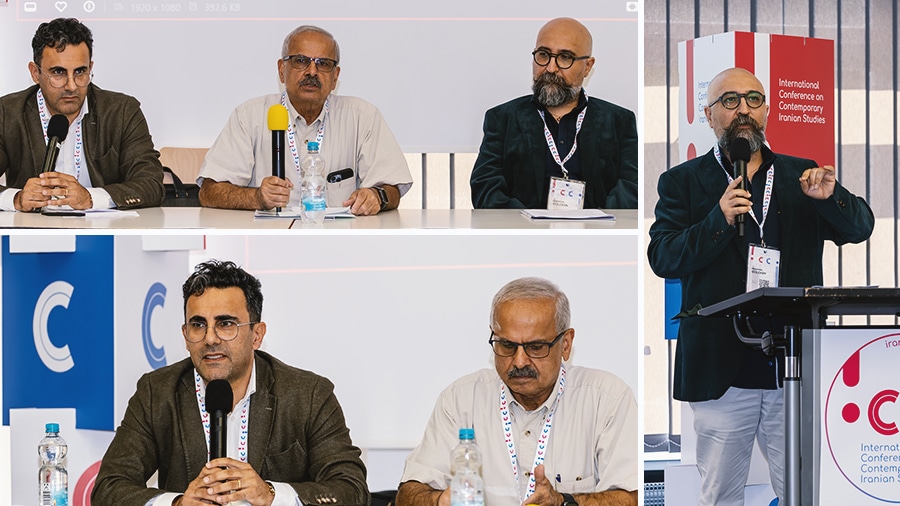Pezhman Golchin
“Totalitarianism” as a Trans-Regional Global Environmental Crisis – with Reference to Iran’s Environmental Crisis
Mansour Sohrabi
Environmental Democracy is the Necessity of Tomorrow’s Iran
Moderator: Jalil Roshandel
The panel titled “Environmental Crisis and Political Systems: Totalitarianism vs. Democracy” addresses the complex relationship between political structures and environmental issues, focusing on the impacts of both totalitarian regimes and democratic systems on environmental protection. Two speakers delve into the global environmental crisis, with a particular emphasis on the situation in Iran, highlighting how different political systems influence the ability to manage and mitigate environmental challenges.
Speaker 1: Pezhman Golchin
“Totalitarianism” as a Global Environmental Crisis – With Reference to Iran’s Environmental Challenges
Pezhman Golchin’s presentation centers around the notion that environmental crises transcend national borders, emphasizing the need for a comprehensive and transnational approach to address these issues. Golchin argues that environmental concerns, such as pollution, deforestation, and climate change, are not confined to specific countries or regions, but are global problems that require collective action.
The speaker highlights that factors such as rivers, oceans, and atmospheric conditions do not adhere to political boundaries, and thus, environmental degradation in one country can have severe repercussions on others.
Golchin divides environmental researchers into two primary groups: one that believes humanity is on the brink of an ecological disaster, and another that advocates for maintaining environmental health, even if nature as a whole is not immediately threatened. Despite their differing perspectives, both groups emphasize the importance of regulating industrialization and urbanization processes to minimize their environmental impact.
One of the key points in Golchin’s talk is the inadequacy of isolated national efforts to tackle environmental issues. He stresses that while individual nations may focus on improving their own environmental regulations, the interconnected nature of ecosystems means that pollution or environmental damage in one part of the world inevitably affects others. This interconnectedness necessitates global cooperation and a reevaluation of how governments and political systems approach environmental management.
Golchin draws attention to the relationship between totalitarian regimes and environmental degradation. Using global air pollution maps and democratic indices, Golchin explores the idea that non-democratic, totalitarian regimes, such as Iran’s, are more likely to contribute to environmental crises.
He argues that totalitarian governments, which lack transparency and accountability, tend to prioritize industrial growth and resource extraction over environmental protection, exacerbating global ecological problems.
In the case of Iran, Golchin points out several environmental disasters caused by government mismanagement, such as air pollution, water scarcity, and soil degradation. He emphasizes that totalitarian regimes not only harm their own environments but also contribute to global ecological instability.
Golchin concludes that addressing the global environmental crisis requires not only environmental activism but also political activism aimed at transforming totalitarian regimes into more democratic systems. In his view, only democratic systems can provide the necessary conditions for effective environmental protection through public participation, accountability, and transparency.
Speaker 2: Mansour Sohrabi
The Necessity of Environmental Democracy for the Future of Iran
Mansour Sohrabi’s talk focuses on the concept of “environmental democracy” and its importance for Iran’s future. He begins by examining the environmental degradation that has occurred in Iran over the past century, attributing much of it to government policies that have resulted in irreversible damage to the country’s ecosystems.
Examples of this damage include the drying up of lakes, wetlands, and rivers, deforestation, soil erosion, salinization of water, and the increasing frequency of floods and droughts. Additionally, Iran has experienced problems such as air and water pollution, desertification, and dust storms, all of which are worsening due to poor environmental governance.
Sohrabi argues that there is a strong positive correlation between democratic governance and environmental protection. He believes that Iran’s environmental crises cannot be resolved without a transition to a more democratic political system. In his view, a democratic structure that prioritizes “environmental democracy” is essential for tackling the country’s ecological problems.
The concept of environmental democracy, as explained by Sohrabi, refers to a system in which environmental decisions are made with the active participation of all those affected by the outcomes, not just governments or industrial stakeholders. It is based on principles of public participation, transparency, and environmental justice.
In this system, local communities, civil society organizations, and individual citizens play a critical role in environmental decision-making processes, ensuring that diverse voices and perspectives are considered.
Sohrabi stresses the importance of decentralization in achieving environmental democracy, arguing that centralized, authoritarian systems are ill-suited to address environmental challenges because they often ignore the needs and concerns of local populations. In contrast, a decentralized system would allow for more localized and context-specific solutions, empowering communities to take charge of their environmental futures.
Sohrabi concludes that environmental democracy is not only a solution for Iran’s environmental issues but also a broader political imperative. By fostering greater public participation and ensuring that environmental justice is at the forefront of policy-making, Iran can move toward a more sustainable future. He emphasizes that the transition to a democratic political system is a necessary step for both protecting the environment and ensuring long-term social and economic stability in the country.
Conclusion
The panel highlights the intricate link between political systems and environmental crises, with both speakers emphasizing that effective environmental protection is inextricably tied to democratic governance. Pezhman Golchin discusses how totalitarian regimes contribute to global environmental problems due to their lack of transparency and public accountability, while Mansour Sohrabi advocates for environmental democracy as a solution to Iran’s ecological crises.
Both argue that the global environmental crisis cannot be resolved without addressing the political structures that enable environmental degradation. Through democratic participation and decentralized decision-making, societies can work towards more sustainable and equitable environmental outcomes.


